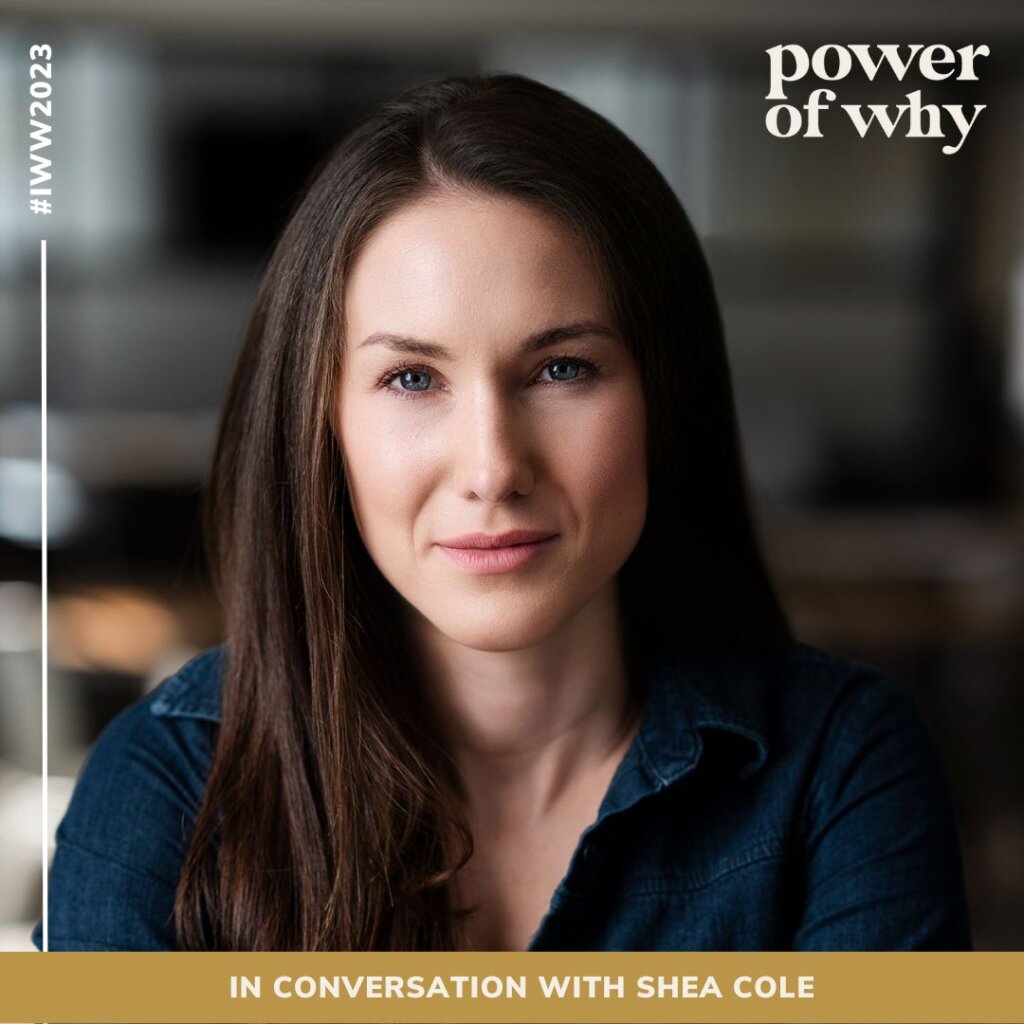Home » Shea Cole on Forging Your Own Path and (Not) Doing it All
Shea Cole on Forging Your Own Path and (Not) Doing it All

Feb 14, 2023
 This featured story is brought to you by the Power of Why Podcast in collaboration with Invest Ottawa, with critical support from BDC Capital’s Thrive Venture Fund and Title Sponsor of International Women’s Week. We teamed up to produce this special series to celebrate women leading in Ottawa for International Women’s Week (IWW 2023) and shine the spotlight on our IWW 2023 featured leaders to unpack their passion and purpose.
This featured story is brought to you by the Power of Why Podcast in collaboration with Invest Ottawa, with critical support from BDC Capital’s Thrive Venture Fund and Title Sponsor of International Women’s Week. We teamed up to produce this special series to celebrate women leading in Ottawa for International Women’s Week (IWW 2023) and shine the spotlight on our IWW 2023 featured leaders to unpack their passion and purpose.
Each year, five inspirational leaders are selected to represent International Women’s Week. They are role models achieving a significant impact on our economy, community and society, and embody the spirit, goals and values of IWW.
Under the careful heat of calculated risk, Shea Cole — growth marketer, brand builder, mentor, mom and VP of one of Canada’s fastest-growing companies, Field Effect — has forged her own path.
Leaving her beloved small town to explore the world. Pursuing an MBA despite being “bad at math.” Scaling health tech darling Fullscript’s less than 30-person team to over 1,000 employees. Choosing to grow her family at the height of her career.
How’d she do it? By not trying to “do it all,” and getting focused instead.
This episode is for you if:
- You’re about to make a (professional, personal) leap and could use some validation
- You’ve considered a career in marketing, or want to be a more effective marketer
- You’re struggling to build your career in a new country
- You’re nervous about AI, but recognize its significance
Looking for a specific gem?
[3:36] The best advice Shea got from her mom
[5:27] Why risks and change are good for you
[6:00] Shea re-evaluates what she was praised for as a child
[8:23] A creative falls in love with the numbers of marketing
[12:00] Your marketing strategy is useless without market research
[17:40] What it takes to build a great team
[20:00] On motherhood
[24:33] Changing the game: a remote work story
[26:17] How Shea generates innovative ideas (steal this)
[33:26] The (exciting! worrying!) world of ChatGPT
Listen to the episode on Spotify / iTunes / Google Podcasts
Tune in to the podcast or take the time to digest each article found below. Regardless of the format, there’s great content in store for you!
Naomi Haile: I would love to start with your origin story. How did you grow up?
Shea Cole: I grew up in Massachusetts in a very rural community. My mom was such an incredible role model. She is a career woman and impressed on me that while we love where we live, you need to experience the world.
She told me to forge your own path, and never depend on others for your success.
That has been the most important advice I’ve ever received. Because whenever I feel like “okay, crap, this is not going the way I want,” it’s that attitude of “only you can find the way out of this.” That way your relationships can be focused on love and friendship and learning and sharing good energy because you’re not dependent on others.
Naomi: How did that play a part in your curiosity, and your willingness to just try things?
Shea: I am very thoughtful about risk. If I see a scenario where the worst thing that could happen is not as extreme as the best thing that could happen, then I don’t shy away from change.
There is a huge benefit to just taking the risk and embracing change.
Naomi: And it’s definitely paid off. In our earlier conversation you talked about growing up and not really thinking that you were good at math, so you pursued an arts degree. When did things change for you?
Shea: From a very young age I got a lot of praise for my artwork and my writing. I didn’t do poorly in math, but I wasn’t in that top spot in math. In my mind that meant I must not be good. Back then, the math we did in school was never presented as a life skill. It was like, here’s this formula, learn how to do it. But we didn’t really understand why.
When I entered the agency world after I graduated, I thought I would be on the creative side. But I fell in love with the strategy of marketing, which is about applying quantitative techniques to a creative output. All of a sudden I started to see a “why” in math — that’s when things changed.
I went back to school and I did my MBA. I was the only one there with my fine arts degree. That was a big change, and not an easy change, but man, am I happy I did it. Because now marketing is only more data and quantitative-focused.
Naomi: When you started your program did you ever try to talk yourself out of it?
Shea: A second year student told me that they don’t design business school for you to succeed at everything. If you wanted to do every single reading, study for every exam, participate in every case competition, go to networking events, and take advantage of the tutorials — it’s not humanly possible.
You have to accept the fact that you can’t do it all, you can’t be great at it all — and thank God I learned that lesson early, because man does it apply now that I have kids and a career.
Naomi: How do you use the skills you learned on the quantitative side as a marketer?
Shea: I’ll talk about the importance of market research. It’s really powerful when you can understand your market, your target audience, through the lens of real data. You’re not just guessing what they like. Talking to a few people here and there is good directionally, but it’s not statistically significant.
Something I like to leverage if I have the time and the money to do so is a segmentation analysis, which is basically a cluster analysis. You put a targeted survey out to the entire market of people you think you could sell your product to. You go in without making any assumptions and let the data tell you what differentiates groups.
You might find that people’s age doesn’t determine a difference in behavior, attitudes or beliefs towards your product, but their geography or education level does. You start to understand which variables are actually important when it comes to targeting your product.
In tech you can understand which clusters exist within your market so when someone comes into your funnel, through a form fill or they’re talking to a sales rep, you can ask them very specific questions to type them into one of those clusters. Then you can feed them content that speaks to those variables, those attitudes and beliefs that define the cluster. That’s how you create a more targeted funnel all the way down to someone being a loyal customer.
Naomi: Is marketing the same wherever you go?
Shea: Every company is different. There are marketing fundamentals that hold true that are really psychology based. However technology — the way we serve ads, connect with our customers and mine data to create content — is changing constantly.
The other thing is how your product is sold. When I was at Anheuser-Busch our products were Budweiser, Bud Light, Stella Artois, Corona. We didn’t sell the products, so our marketing team was responsible for generating awareness and affinity for our products and giving tools to our partners who were selling for us.
You take a completely different approach at a software company where you’re responsible for following your customer from the moment they’re aware of your product, to when they buy it, renew their payment and give you a referral, while working to make sure they don’t churn. It’s a closer relationship.
Naomi: From a leadership perspective, what have you learned about building great teams?
Shea: The most important thing is who you hire, and making sure they’re excited when you do — because keeping people excited is easier if they start that way.
In a case study by the Harvard Business School managers were asked if they could only choose one, whether they prefer that their staff be competent or likable. Most chose competence. But when researchers observed their teams, they saw that if someone was highly competent but unlikable, nobody wanted to work with them. Despite their competence, they weren’t effective within a team.
That was a hard lesson for me. If I can see that someone is smart, I want to reward that competence. But if someone is not contributing positively to the team, it’s not something you can reward. Toxicity can be contagious. As a leader, you’re working really hard to keep everyone engaged and passionate about the work. One toxic person can make that next to impossible.
Naomi: Now I’d love to talk to you about motherhood. As someone who is very ambitious and career-oriented, when you decided to start a family, what were you navigating mentally and emotionally?
Shea: You have to go out and make it happen for yourself. I grew up watching my extremely high-functioning mother seemingly do it all. That confidence she gave me has been really powerful.
It never occurred to me that I was going to put my career on pause to have children.
I just thought, “oh, yeah, I want to have kids and lots of women are mothers and successful in their career.” No one talks about how hard it is to come back from a year away from a company, and expect your job to be the same. It’s next to impossible unless you work at a company where the pace is slower and the industry is more stable. But in a tech startup so much changes in a year — the size of the company could double, and they can’t wait for you.
The number of opportunities I missed during that time is probably staggering. I want to talk to women about this to reassure them that it’s going to be a career pause while you’re doing this thing with your baby. It’s probably going to be rewarding and worthwhile but that doesn’t mean the return to work won’t be hard. But you also have your entire career ahead of you.
Naomi: When you talk about women being prepared for that shift, did you find that you had that support system around you?
Shea: We don’t have family that lives nearby but my parents come several times a year and stay for extended periods of time, so does my partner’s mother. So we do have that support. We’ve got neighbors that are really close friends and will help us out pick up kids and stuff in a pinch.
I think the most valuable thing that happened was this shift to remote work. And as much as I miss those in-office, spur of the moment brainstorm sessions, being able to work from home and not commute makes my schedule a lot easier with the daycare drop off and pickup. It’s a game changer for parents.
Naomi: I’m curious, besides brainstorming in a notebook or on a whiteboard, what tools do you typically use to come up with new ideas?
Shea: Recognizing that I’m not always in a creative mood, and that when I am I need to clear time to embrace it. If I don’t feel a natural flow of ideas, I won’t force it. There’s lots I need to get done. I’ll respond to emails, read through reports, or book meetings to check things off my list. Inevitably there’s going to be a moment where I do feel the creative juices flowing. Sometimes it’s while I’m making dinner. I’ll pull out my phone, write down notes, and as soon as I get my kids in bed I’m back on my laptop.
You want to make sure that you’re harnessing that energy when it comes.
Naomi: You’re also a mentor and you work with women and new immigrants with the Ottawa Community Immigrant Services Organization. What about this work is so meaningful to you?
Shea: I love teaching. When someone is new to the country they just need to learn the culture, what people expect your resume to look like, what to put on your cover letter, how to network. It’s easy for me to provide that information because I have the advantage of having been in North America my whole life.
We’ve got some incredibly intelligent and experienced people that moved to this country and feel so lost and defeated. It’s a culture shock, where they’ll have 15 years in marketing but are in interviews with people throwing buzz terms they’ve never heard before. Then you have someone who is incredibly experienced and intelligent taking an entry level job and starting from scratch just because of a culture clash. It’s hard to find great talent, so if I can help those people merchandise themselves and become more obvious to employers I can solve that problem.
Naomi: You just mentioned merchandising yourself, and that’s what it’s about right?
Shea: That’s the secret sauce to success in the business world. It’s challenging for some people when they first start out because we are taught at a young age that bragging is not a good thing and that you should be humble. But in the business world if you don’t talk about your work, and if you don’t put your work in front of the boss, and the boss’s boss, you’re not going to get those opportunities. No one will give you credit and you won’t progress.
Naomi: The last question I love to ask is, what is one thing in your industry that you are really excited about?
Shea: I don’t know if I’m excited so much as cautiously optimistic. But there’s a lot of buzz right now about AI. We’re at a turning point. The people who embrace it are gaining an unfair advantage. But at the same time we also know that algorithms are already starting to figure out when a piece of content is written by a human versus AI. The artist in me hates the idea that an AI’s creative process would replace that of a human. How do you jump on board and leverage the power of this thing, for Speed and for scale and information, without letting it replace the creative side of what humans do?
Connect with Shea
LinkedIn – Shea Cole
Shea’s Medium Page – https://medium.com/@sheacole08
People and Resources Mentioned in This Episode
Competent Jerks, Lovable Fools, and the Formation of Social Networks by the Harvard Business Review
About the Power of Why Host, Naomi Haile

An intrapreneur, consultant, and interviewer.
Naomi Haile is curious about people, their paths and what drives them. In 2017, she launched the Power of Why Podcast. Her guests have taken the non-linear path in business, venture capital and other creative professions to share their story. Each episode explores people’s philosophy on life and work.
As we all navigate our lives and careers, Naomi hopes that everyone she connects with – guests and listeners – can shape products, companies, and communities of impact.
Naomi is a consultant at QuakeLab. She is starting graduate school at Columbia University.
In support of its Women Founders and Owners strategy, Invest Ottawa offers programs and services that enable and accelerate the growth and success of women entrepreneurs from every walk of life. Visit www.investottawa.ca/women to learn more!
Invest Ottawa
https://investottawa.ca
Invest Ottawa, is Ottawa’s leading economic development agency for fostering the advancement of the region's globally competitive knowledge-based institutions and industries. Invest Ottawa delivers its economic development services through a unique partnership with the City of Ottawa, where the City and Invest Ottawa, through its members set the strategy and manage the programs that move Ottawa’s economy forward. Invest Ottawa is a non-profit, partnership organization that operates on an annual budget that comes from a variety of sources including: municipal, federal and provincial government; membership fees; professional development programs; and private sector contributions.


